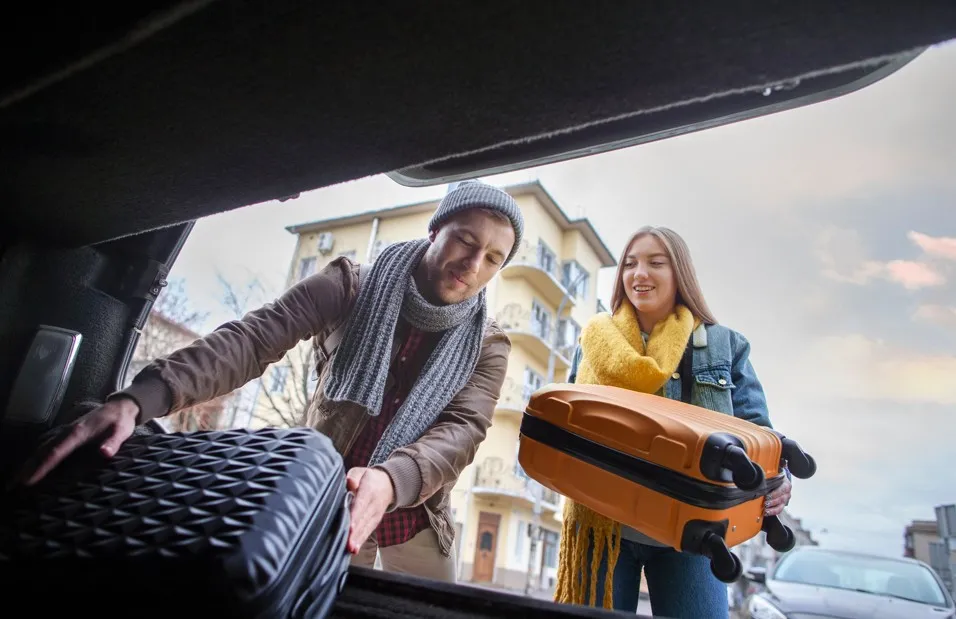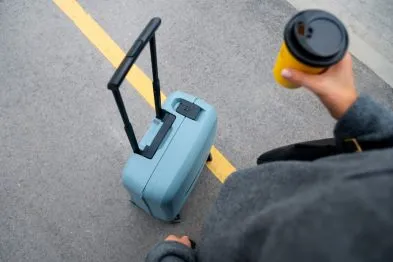When planning a trip, it’s important not only to pack your suitcase but also to know what can and cannot be carried across the border. This will help you avoid violating customs regulations or delays on the road. In the article, we’ll explain the main rules and help you prepare for your journey.
What You Can Carry Across the Border During Bus Travel
During international bus trips, passengers may carry only personal belongings – clothes, shoes, cosmetics, documents, essential gadgets, or medicines. The main rule is that all items must be for personal use, not for sale.
Food should be taken only in factory packaging and in small quantities. Homemade meals, meat, and dairy products are prohibited in most EU countries. If you’re unsure, it’s better to check the regulations of the destination country in advance or declare your products at the border.
To avoid delays, keep receipts for electronics or purchases, don’t exceed the luggage limit, and make sure all bags are clearly labeled.
For convenience, book passenger transportation and get full support from an experienced team that knows how to make your journey smooth, even at customs.
What Food Can Be Carried Across the Border from Ukraine to Poland
When you travel by tour bus, customs checks usually go faster and more smoothly because luggage is inspected centrally.
What can you take across the border from Ukraine to Poland? Polish customs officers are particularly strict about food products. The general rule is simple: don’t bring anything that can spoil or lacks factory packaging.
The products that are usually allowed in small quantities include packaged snacks, chocolate, cookies, tea, coffee, bottled water or juice, and baby food in sealed packaging. In short, what can be carried across the border to Poland are small quantities of factory-made food.
And what food cannot be carried across the border? Homemade meals, meat, sausages, dairy products, cheese, fish, and unmarked goods.

What Is Forbidden to Carry Across the Border to EU Countries
All European Union countries have unified restrictions. Below is the list of what is forbidden to carry across the border:
- narcotic substances and strong medicines without a prescription;
- weapons, ammunition, fireworks without authorization;
- animals without a veterinary passport;
- plants without phytosanitary certificates;
- cultural valuables without official permission.
Separately regulated is what is forbidden to carry across the Polish border. This includes any animal-origin products and homemade food. Alcohol and tobacco are allowed only in very limited quantities – check the rules of the country you are visiting.
Differences in Transport Rules Between Poland, Slovakia, Hungary, Germany, and Romania
European countries share a common customs policy, but the details differ.
Slovakia is tolerant of small purchases but limits alcohol quantities.
- What cannot be carried across the Slovak border? Alcohol above the allowed limit, unmarked food, homemade goods.
- What can be carried across the Slovak border? Factory-made sweets, souvenirs, small household items.
Poland strictly controls food and alcohol.
- What cannot be carried across the Polish border? Meat, cheese, homemade preserves, wine, or cigarettes exceeding the limit.
- What can be carried across the Polish border – sweets, snacks, beverages in small quantities, and gifts for personal use.
Hungary closely monitors fuel and tobacco.
- What cannot be carried across the Hungarian border? Counterfeit goods, large quantities of merchandise, unpackaged liquids.
- Allowed – personal belongings, small purchases with receipts. Up to 10 liters of gasoline or diesel can be carried in a canister without declaration.
Germany monitors the value of imported goods.
- What can be carried across the German border — souvenirs, factory-made sweets, small electronics.
- More expensive items over €300 must be declared.
Romania strictly regulates meat and dairy products.
- What cannot be carried across the Romanian border? Homemade food, unmarked canned goods, raw meat.
- What can be carried across the Romanian border — snacks, tea, canned food in original packaging.
As you can see, each country has its own customs rules and specific requirements. During trips across Europe with several stops, it’s much more convenient when everything is organized. Minibus rental allows you to travel along a single route, pass customs together, and save time on the road.
How to Avoid Problems at Customs During Bus Trips
To cross the border stress-free:
- keep your documents, receipts, and electronics with you;
- Don’t overload your hand luggage – take only the essentials;
- avoid bringing homemade food, large liquid bottles, or unmarked goods;
- declare any questionable items;
- choose reliable carriers with international route experience.
We offer bus rental with a driver for any European destination. Thanks to a well-planned route and our ongoing support, your trip will be safe and free of unnecessary stress.
FAQ
Can you carry homemade food across the border by bus?
No. Homemade dishes, meat, dairy products, and preserves are prohibited.
Which personal belongings don’t require declaration?
Clothes, hygiene items, one phone and laptop, and cash up to €10,000.
Do food items need to be declared if there are only a few?
No, if they’re factory-made goods without meat or milk, within the allowed limits.
What should you do if customs confiscate a prohibited item?
Ask for a written report – such items are not returned.
What goods can be carried duty-free across the Polish border?
Personal belongings within the established customs limits – usually worth up to a few hundred euros, without the need for declaration.




